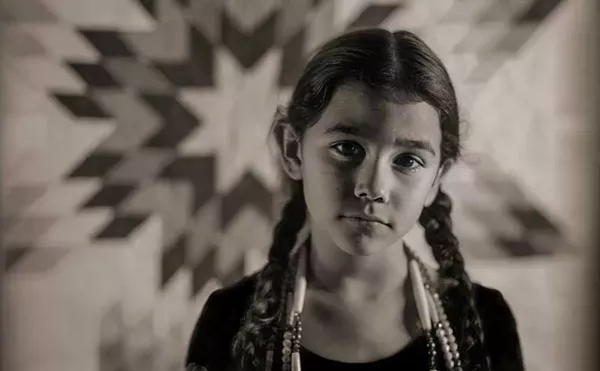
Audio By Carbonatix
[
{
"name": "GPT - Leaderboard - Inline - Content",
"component": "35519556",
"insertPoint": "5th",
"startingPoint": "3",
"requiredCountToDisplay": "3",
"maxInsertions": 100,
"adList": [
{
"adPreset": "LeaderboardInline"
}
]
}
]
Nobody can wring terror out of the mundane like Michael Haneke. In the writer-director's latest exercise in minimalist dread, the director puts the screws to yet another seemingly happy, upper-middle-class Parisian family, and doesn't let up, not even after the movie's final credit rolls. Not a whole lot actually happens in Caché: If you're looking for a booming score, a ridiculous car chase or even a villain, you'd be best advised to wait for the next Harrison Ford film. Haneke replaces the clichés of Hollywood thrillers with something even scarier: symbolic, existentialist horror that evokes the suffering in the world today. The end result is one of the creepiest, most unnerving experiences you'll have at the movies all year.
Much of the film plays like the hypnotic opening stretch of David Lynch's Lost Highway, only without Robert Blake in weird kabuki makeup. Well-off intellectuals Georges (Daniel Auteuil) and Anne (Juliette Binoche) begin receiving anonymous videotapes and of them coming and going during the day, and surveillance shots of their house. Since Georges hosts a TV talk show, at first they just assume they were made by one of his "fans." But then the videos begin to arrive with childlike drawings of a young Arab boy with blood streaming out of his head. Georges denies any knowledge of or connection to the drawings, but it becomes clear that he's withholding information from his wife and son: As a child, his family befriended a young Algerian boy named Majid. As the tapes gradually show more specific images, Georges suspects that Majid — now a grown man living in squalor on the city's outskirts — might have something to do with them.
The mystery of Majid provides a conventional story arc, but Haneke doesn't serve up any sort of bad guy. As bland and innocuous as the videotapes are, they begin to hint at something even more rotten: Georges and Anne's already disintegrating marriage. The intrusion into their personal lives only stirs up their festering resentments and paranoia, and underlines how emotionally closed-off they've become. Seeing a performer of Auteuil's status act so passive and ineffectual adds to the film's perfectly calibrated sense of frustration. There'll be no hugging or learning here: Haneke suggests that just about everyone in the film is tragically unaware of how responsible they are for the misery of others. What's more, Majid's race and the constant references to news reports of the conflict in the Middle East make it clear that Haneke is implicating Georges and Anne in something bigger than just their own petty personal lives.
Haneke's less-is-more style only heightens the sense of fear and culpability. Only a handful of directors — Lynch comes to mind — can get as much mileage out of one carefully placed image or juxtaposition: When Haneke cuts to a shot of a Middle Eastern boy with blood draining out of his mouth, the shock is compounded by the fact that the rest of the film has been so still and quiet. He ups the ante by using distant, stationary camerawork, so that you're never quite sure if what you're watching in Caché is the stalker's latest videotape, or the film itself. And comforting resolutions aren't part of his scheme. As the film's final shot rolls, you'll find yourself desperately scanning the image for some sort of answer, only to leave feeling as guilty and oblivious as Georges and Anne.
In French with English subtitles. Showing at the Detroit Film Theatre (inside the DIA, 5200 Woodward Ave., Detroit), at 7 and 9:30 p.m. Friday and Saturday, Feb. 10-11 and 17-18, and at 4 p.m. on Sunday, Feb. 12 and 19. Call 313-833-3237.
Michael Hastings writes about film for Metro Times. Send comments to letters@metrotimes.com.





